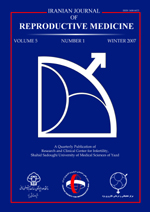
|
International Journal of Reproductive BioMedicine
Research and Clinical Center for Infertility, Shahid Sadoughi University of Medical Sciences of Yazd
ISSN: 1680-6433
EISSN: 1680-6433
Vol. 19, No. 11, 2021, pp. 979-986
|
 Bioline Code: rm21101
Bioline Code: rm21101
Full paper language: English
Document type: Research Article
Document available free of charge
|
|
|
International Journal of Reproductive BioMedicine, Vol. 19, No. 11, 2021, pp. 979-986
| en |
Association between serum 25-hydroxy vitamin D level and menstrual cycle length and regularity: A cross-sectional observational study
Singh, Vinita; Tamar, Neelam; Lone, Zamir; Das, Esha; Sahu, Rajshree & Majumdar, Sagarika
Abstract
Background: Research examining the role of vitamin D deficiency and the
development of menstrual disorders in women is of widespread interest. Studies have
been published showing that supplementation with high-dose vitamin D can lead to the
restoration of the menstrual cycle. We lack adequate information regarding the effect
of vitamin D levels on the physiology of menstruation and further on fertility in women
of reproductive age due to the contradictory results reported by studies.
Objective: To study the association of 25-hydroxy vitamin D with menstrual cycle
characteristics including long and short cycle length and cycle irregularity.
Materials and Methods: In this cross-sectional study, serum vitamin D levels of
166 women attending an outpatient department with menstrual irregularities after
excluding all obvious causes of menstrual disorders (n = 83) between April-June 2019
were measured and were compared with women of similar profiles with complaints
other than menstrual irregularities (n = 83).
Results: A decreased level of vitamin D was associated with a 13.3 times odds of
an irregular cycle (OR (95% CI): 13.30 (5.79-30.60), p < 0.001). 25-hydroxy vitamin D
was not associated with age or body mass index. We found a significant difference
(p < 0.001) in mean vitamin D levels among the females with irregular cycles vs. regular
cycles.
Conclusion: Vitamin D plays a role in the physiology of reproduction specific to the
menstrual cycle and ovulation. Long-term prospective studies assessing the exact
cutoff value and the exact dose of supplementation required are needed.
Keywords
Menstrual disturbances; Ovulation; Reproductive period; Vitamin D deficiency; Dietary supplements; Polycystic ovarian syndrome.
|
| |
© Copyright 2021 - International Journal of Reproductive BioMedicine
Alternative site location: http://www.ijrm.ir
|
|
